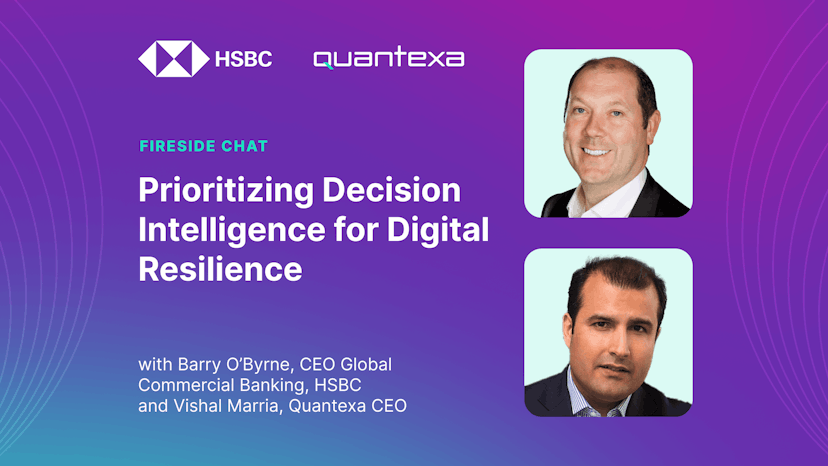The banking industry’s agility and competitive speed have traditionally been hampered by the regulatory climate and the slow process of transforming traditional face-to-face banking to a digital-first model. Both business and individual customers favor digital tools for banking (and some may have never been inside an actual bank branch).
In the personal banking segment of the market, consumers are generally less satisfied with their banking services, and more likely to switch banks, according to Deloitte. On the corporate banking side, customers want real-time analytics, not end-of-day batch processes, reports Finextra. Banks need to generate insights rapidly from their data sources directly while allowing customers to see account status instantly.
Balancing the customer experience is a big enough challenge on its own, but in recent years, there’s been a new competition for carving out space in the market: fintechs, which are disrupting traditional banking and offering targeted solutions with better servicing. In a PwC survey of financial services leaders, 73% of senior financial executives perceive consumer banking as the one most likely to be disrupted by fintechs. Also, only half of the survey respondents from the banking sector (53%) believe they are consumer-centric, compared with over 80% of fintech respondents.
Decision Intelligence (DI) can bridge the gap between guessing at customers’ wants and needs, and knowing specifically how to put plans into action. This knowledge and confidence starts with trusted data, which empowers banks to make effective decisions to meet market challenges and claim a leadership role in the fintech economy.
The formula for successful competition in the banking sector rests on finding new customers, growing customer relationships, and protecting customers and the bank itself. These three goals may sound simple, but without context for data around customers, building and strengthening a customer base becomes a bank’s biggest barrier to success.
Change and challenges
There are more challenges looming for banks than just competition or retaining customers. There are macro risks, such as geopolitical conflict and inflation, that banks can’t control – but that factor into financial crimes that can significantly disrupt business.
Geopolitical risk. It’s at the top of the agenda for many CEOs, according to McKinsey & Company’s latest survey of global economic conditions. When conditions are uncertain, banking leaders respond by intensifying their focus on resilience.
Global recession. Inflation has surged, and geopolitical tensions, supply chain disruptions, and rising interest rates threaten a global recession.
Acceleration of technologies. The Covid-19 pandemic accelerated the use of powerful technology solutions helping to drive growth and productivity. These technologies are now being applied to other critical areas of business.
Some challenges are specific to the banking industry:
Growing revenue: Acquiring new relationships and growing existing ones quickly and cost-effectively has never had as much focus as it does today. And growing revenue is very challenging, due to competition, regulatory pressure, and global economic conditions.
Cost issues: With the possibility of a global recession on the horizon, banks must make significant improvements to bring costs down. Having clear governance and a cohesive path to digital transformation is essential for future sustainable growth.
Rapid operational change: Amid fierce competition, banks must deliver on cost savings while continuing to meet the demands of customer expectations.
Competition: New digital banks offer customers a far better digital experience, at lower cost. They are not subject to the same banking regulations as traditional banks that must deal with stricter regulations, while at the same time competing by enhancing the quality and usability of data to deliver personalized services.
Why banks need Decision Intelligence
Banking success rests on a value chain that represents the lifecycle of the business. To manage radical shifts in financial services, fend off competition from fintech startups, and deliver new products and services, banks must succeed in every step of the value chain.

Find and grow new customers
Maximize revenue growth opportunity and share of customer wallets
Improve speed-to-wallet opportunities to accelerate revenue
Identify customer profile changes quickly, optimizing service, revenue, and risk
Automate inefficient manual processes to reduce costs and improve the customer experience
Protect customers and optimize revenues and costs
Identify additional risks to reduce the cost of financial crime
Improve speed of identification
Remove redundant, ineffective, and manual controls
Accelerate and support digitally driven services and transformation initiatives
Maintain accurate and perpetual Know Your Customer (pKYC) records and reduce the operational cost of manual processes
Unify data from multiple sources
Create an enriched, accurate, and complete view of customers and suppliers
De-duplicate and join data even without keys.
Create reusable data products to support multiple business use cases from the same platform
Ingest data once and use it for many use cases
With Quantexa’s whole-enterprise contextual Decision Intelligence solutions, everyone in banking organizations can empower teams to use trusted decision-making to meet market challenges and claim a leadership role in the fintech economy.
Decision Intelligence in action: ABN AMRO
Banks around the world continue to struggle with complexities and inefficiencies in the know-your-customer (KYC) process, particularly for corporate clients who can have several subsidiaries, beneficial owners and hierarchies, business lines, and regional operations. ABN AMRO employs thousands of KYC staff, who spend significant time and effort on KYC investigation processes. The Amsterdam-based bank wanted to reduce manual data-gathering by providing employees with the tools needed to make faster and more efficient decisions at scale.
ABN AMRO chose Quantexa’s Decision Intelligence Platform to provide a single view of customers, enriched with intelligence about the relationships between people, organizations, and places. The Quantexa platform has helped the bank work with millions of customer accounts, plus 30 million accounts from a commercial data provider. The bank found that for complex KYC investigations, investigators now spend less time to understand client data and context, freeing up time to focus on genuine criminals.
Quantexa has also broken down barriers between previously siloed processes, thereby supporting a continuous KYC approach. In addition, by reducing the need for repeated requests to bank clients for KYC documentation, ABN AMRO has reduced friction in the client lifecycle and improved the customer experience.
Learn more about ABN AMRO’s successful use of Quantexa.
How the Quantexa Decision Intelligence Platform works
Quantexa helps enterprises make better, more informed decisions by capturing dispersed data and making it understandable and actionable. We use best-in-class Entity Resolution to build a data foundation that fully represents your organization. We then establish networks that reveal hidden connections and apply advanced analytical models to identify risks and opportunities.
The result? A continuous stream of relevant insights that maximize the value of your data assets – insights that help you solve business problems and capture otherwise hidden opportunities. And it’s all delivered through one platform.
The platform to transform your decision making

Unify data
Integrate any source at scale to build a trusted data foundation
With multi-source data ingestion, you can rapidly onboard any source – internal, external, structured, or unstructured
Using Entity Resolution, you can bring siloed, disparate, and messy data together at scale for accurate single views.
Continuously improve data quality as part of the unification process.
Create context
Reveal relationships and insights, create stronger analytics
Reveal the relationships and context of how people, organizations, places and other entities interact with each other
Generate insights that build stronger, more meaningful analytical models
Using our open and easy-to-use tools and frameworks, your teams can make use of the full power of innovative Graph, AI, and machine learning methods
Decide and act
Augment and automate decision-making for actionable insights
Automate manual, high-volume operational decisions and maximize your investments in AI for efficiency and cost savings.
Transparent models mean each decision is explainable, with full visibility for security and regulatory requirements as well as model validation and optimization purposes
Empower teams to proactively explore insights and act - making faster, more confident, and more accurate decisions.
Get started with Decision Intelligence
Banks can realize immediate value by using the Quantexa Decision Intelligence platform with every available dataset. Here’s your guide to seeing rapid and ongoing value from your Quantexa investment.
Unlock value, repeatedly
Pick another line of business and a use case, and continue building out the data foundation as part of your existing infrastructure.
Continue optimizing
With a unified data foundation and additional use cases, you’ll create a culture of continual optimization where confident decision-making becomes the norm.
Drive decision maturity
Continually increase your capabilities by deploying new technology advancements, along with learning and certification opportunities for your workforce.
Become resilient and agile
Your data foundation is immediately ready for any use case, giving your organization flexibility, resiliency, and agility to be ahead of the curve and address any threat or opportunity.

 Laden
Laden



